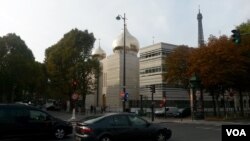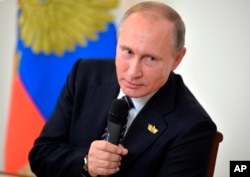Pedestrians pause to take in the towering gold spires of Russia’s latest export, sitting in the shadow of the Eiffel Tower. Tape still fences off the gleaming white complex that houses an Orthodox cathedral, cultural center and school.
Yet even before its inauguration Wednesday, the new $187 million Orthodox Spiritual and Cultural Center has provided the backdrop for high drama, underscoring geopolitical tensions, partisan sniping and the complicated relations among the Russian diaspora here.
'Saint Vladimir'
Some see the complex as underscoring Russia’s spreading influence under its leader, Vladimir Putin, at a time of chilling relations between Moscow and the West.
In “Saint Vladimir,” as the center is dubbed by the local media, Putin is sending the message, “I’m here, we are here in the heart of Paris,” broadcaster RTL concludes.
Others disagree.
“People shouldn’t read all of Russian politics through this cathedral,” says Orthodox theologian Jean-Francois Colosimo. “It’s much more complex. In all Orthodox countries, cultural diplomacy passes through religion.”
French-Russian ties were on the upswing when the center was conceived in 2007 under former French President Nicolas Sarkozy.
“The Patriarchate counts half of the Orthodox world among its faithful,” Colosimo says. “So it needed a site that was exemplary.”
That was before hostilities in Ukraine led to European Union sanctions against Moscow, and before Russia’s intervention in Syria deepened tensions with the West.
There is no chance of red carpet treatment today.
Last week, Putin canceled his Paris visit after French President Francois Hollande suggested Russia might be subject to war crimes over its bombing of Aleppo and made it clear there would be few diplomatic niceties should he visit.
Hollande himself has not emerged unscathed. Coming during an election season, his snub to Putin was quickly seized on by his political foes.
“I have disagreements with Putin, but how do you find a solution when you don’t talk?" said Sarkozy, who is again seeking office and who called Hollande’s actions irresponsible.
Parishioners’ view
The political sniping seems a universe away from the Church of the Three Doctor Saints, a Russian Orthodox church a couple kilometers from the new complex.
A handful of parishioners gather for the two-hour morning Mass, some kneeling in prayer. A woman reverently kisses a shrine balancing on a chair. Others stand in line for confession before a trio of priests clad in golden robes.
“It’s a wonderful idea to have a new Russian Cathedral in Paris,” said 31-year-old Alexandra Lastovka, who describes herself as French-Russian. “I definitely will go see it. I hope the life of the Orthodox community there will be as rich and harmonious as our other parishes.”
Not everyone shares her sentiments. Russia’s diaspora is riven by historical and religious divides, with some of its churches loyal to Moscow and others to the rival Patriarchate of Constantinople. Over the years, Russia has steadily gained control over former church property in France that dates to czarist times.
That includes a stunning, century-old Orthodox cathedral in the Rivera city of Nice. Moscow won a court case against its former occupants, whose forbears arrived in France after Russia’s 1917 revolution. The Russian church is now eyeing other property, including a cemetery in the city partially managed by the old diaspora.
Similar tensions also exist in Paris, where the new Orthodox cathedral has an older rival near the Champs Elysees. Built in the 19th century and now covered with scaffolding, the Alexander Nevsky Cathedral similarly broke with the Moscow church after the revolution.
No religious issue
But some Parisians, stopping to stare at the new center, aren’t interested in the tangled history that surrounds it.
“We’re a secular country, so I don’t see why politics should enter into the debate,” says Benedicte Leroy, who finds the complex beautiful.
Trader Laurent Belot agrees: “Each person has the right to his religion.”









